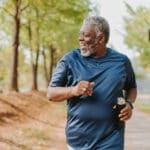Depression: A Growing Global Challenge
Depression is one of the world’s leading causes of disability, affecting over 280 million people worldwide. Traditional treatments—such as antidepressants and psychotherapy—help many, but they’re not always accessible, effective, or well-tolerated.
What if a powerful, low-cost, side-effect-free tool was already available?
A major new study published in The BMJ suggests just that: exercise could be one of the most effective ways to treat Depression, as equally effective as medications and therapy.
The Study: 218 Trials, 14,000+ Participants, One Clear Message
Researchers conducted a systematic review and network meta-analysis, analyzing data from 218 randomized controlled trials involving over 14,000 people diagnosed with Depression.
The goal?
To determine which types of exercise, at what intensity, are most effective for reducing depressive symptoms.
Key Takeaways
1. Exercise Significantly Reduces Depression
Across all studies, people who engaged in physical activity experienced substantial improvements in depressive symptoms, regardless of age, gender, or health status.
2. Best Exercises for Depression
The most effective forms of exercise were:
- Walking or Jogging: Simple, accessible, and highly effective for mood improvement.
- Yoga: Combines movement, breath work, and mindfulness—ideal for stress reduction.
- Strength Training: Boosts self-esteem, builds physical power, and improves brain chemistry.
3. Higher Intensity = Greater Benefit
Moderate to vigorous workouts showed the biggest improvements in mood.
That said, even light exercise helped, especially for beginners or those with severe symptoms.
4. People Stick with Yoga and Strength Training
These two forms of exercise had the lowest dropout rates, meaning participants found them enjoyable and sustainable.
Why Does Exercise Work for Depression?
Exercise has a unique ability to target the biological, psychological, and social roots of Depression:
- Boosts mood-regulating brain chemicals (serotonin, dopamine, norepinephrine)
- Reduces inflammation and improves brain health
- Increases neuroplasticity and helps grow new brain cells
- Builds self-confidence and a sense of mastery
- Provides structure and routine
- Improves sleep and energy
Who Can Benefit?
The benefits of exercise were seen in:
- People with mild, moderate, or severe Depression
- Those with long-term or recent symptoms
- Individuals with physical health conditions (e.g., diabetes, obesity, heart disease)
This means almost anyone can benefit with the right guidance. Bonus tip: Pair exercise with music, a workout buddy, or a favorite podcast to stay motivated.
Cautions & Considerations
- Start small if you’re dealing with low energy or motivation.
- Consult your doctor if you have medical conditions or are new to exercise.
- Mental health support (like therapy or medication) can and should continue alongside physical activity, if needed.
The Bottom Line
This BMJ study adds to a growing body of evidence that exercise isn’t just good for your body—it’s one of the best tools for mental health.
Whether you’re struggling with Depression or looking to protect your mental well-being, movement can be a life-changing medicine. And the best part? It’s free, accessible, and available to you—starting today.
Take the Next Step in Your Depression Treatment Journey
Suppose you or someone you love has been struggling with Depression that has not responded adequately to medication, psychotherapy, and exercise. In that case, TMS is another treatment option that could offer new hope. Mid City TMS provides state-of-the-art treatment delivered by a compassionate team of mental health professionals dedicated to your recovery. We understand the challenges of treatment-resistant Depression and work collaboratively with you to develop a personalized approach. Contact us today to learn more about how TMS could transform your Depression treatment experience and help you reclaim the life you deserve.
Sources:
- Noetel, M., Sanders, T., Gallardo-Gómez, D., Taylor, P., del Pozo Cruz, B., van den Hoek, D., Smith, J. J., Mahoney, J., Spathis, J., Moresi, M., Pagano, R., Pagano, L., Vasconcellos, R., Arnott, H., Varley, B., Parker, P., Biddle, S., & Lonsdale, C. (2024). Effect of exercise for Depression: Systematic review and network meta-analysis of randomised controlled trials. The BMJ, 384, e075847. https://www.bmj.com/content/384/bmj-2023-075847



































